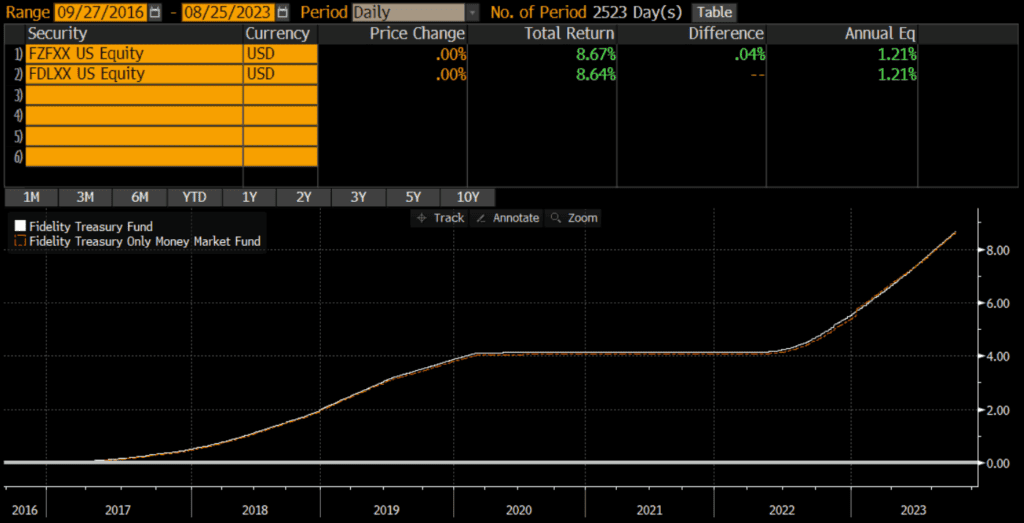Fidelity offers dozens of money market mutual funds, including many government and Treasury money market funds with similar sounding names. Two of the largest funds in the marketplace today are the Fidelity Treasury Money Market Fund (FZFXX) and the Fidelity Treasury Only Money Market Fund (FDLXX). Comparing FZFXX vs FDLXX may be confusing because the name and fund details are nearly identical, although there is one important difference.
The Short Answer
Comparing FZFXX vs FDLXX is interesting because they are nearly identical from a risk and return perspective, but the taxation is very different. FZFXX primarily owns Treasury repurchase agreements (repos), while FDLXX owns actual Treasuries outright (which are exempt from state tax).
FZFXX vs FDLXX Historical Performance
Since their common inception, FZFXX and FDLXX have has identical performance! Currently the yield difference is about .04%, so future performance may deviate more although 4 basis points is a miniscule difference.

Current Yields for FDLXX & FZFXX
The current 7 day yield is a standardized yield metric for money market mutual funds and the 7 day yields for both FZFXX and FDLXX can be found on the fund’s webpages. See here for FZFXX and here for FDLXX.
What rate is FZFXX & FDLXX paying?
The current interest rate for FZFXX, FDLXX, and other Fidelity money markets can be found on Fidelity’s money market page.
FZFXX & FDLXX Details
The expense ratio is .42% for both FZFXX and FDLXX. Neither fund charges a load or 12b-1 fees.
Neither FZFXX nor FDLXX has a minimum investment and investors can invest as little as one cent.
I have not checked every brokerage, but FZFXX and FDLXX are generally only available to clients of Fidelity.
Like most money market mutual funds, investors can sell FZFXX or FDLXX at any time.
FZFXX vs FDLXX Risks
Hypothetically, an investor could lose money with FZFXX or FDLXX, but I personally do not think that is a realistic risk as I believe the fund sponsor or the federal government would intervene if that were about to happen. Technically, it is possible to lose money in FDLXX or FZFXX though.
As of July 31, 2023, FZFXX’s portfolio was over $41 billion, while FDLXX was nearly $5 billion.
IS FZFXX or FDLXX FDIC Insured?
No, neither FZFXX nor FDLXX are FDIC insured.
Holdings
The two funds both invest in Treasury-related securities. However, most of FZFXX’s holdings are in Treasury repurchase agreements (80%), while 81% of FDLXX is in Treasuries that it owns outright. The historical performance and yields are nearly identical because Treasuries and Treasury repos are nearly identical.
Tax Considerations
FZFXX and FDLXX are Treasury funds which means that they invest in Treasuries and related debt instruments. However, taxable investors may find better after-tax yields in municipal (muni) money market funds, which offer tax benefits that may improve investors’ after-tax yield.
Treasuries and Treasury Money Markets
Treasuries are treated very differently than other money market assets (including Treasury repos) for tax purposes. Income from the Treasury repos (that FZFXX owns) is subject to state income tax. Income from Treasury bonds is exempt from state income tax. Therefore, FDLXX is generally a much better choice for any investor subject to state tax.
Muni Money Market Funds
Investors subject to higher tax rates may consider municipal (muni) money market funds due to the fact the interest is typically exempt from federal income tax (and often from state tax too!).
The caveat with muni money market funds though is that the yields can move up and down A LOT. Therefore, the stated yield that an investor looks up on any given day is not necessarily indicative of the future return. To understand why, read my post on muni money market yields.
Rather than expecting a muni money market fund’s stated yield, I encourage investors to expect the trailing average yield (over the past few weeks). Generally speaking, the after tax returns of munis will only be higher than non-muni money markets for those in the highest tax brackets.
High Balances
Investors allocating more than $1 million may want to consider the “Class I” share class of these funds, whose symbols are FISXX (similar to FZFXX) and FSIXX (similar to FDLXX).
Is FZFXX or FDLXX a Better Fund?
As mentioned above, the funds are nearly identical. For investors who live in states with no state income tax or those investing in tax-deferred or tax-exempt accounts (such as IRAs, 401k’s, Roth accounts, etc), then FZFXX has a slightly higher yield. However, nearly all of FDLXX’s income is exempt from state tax, so the after-tax yield is meaningfully higher for investors subject to state taxes.